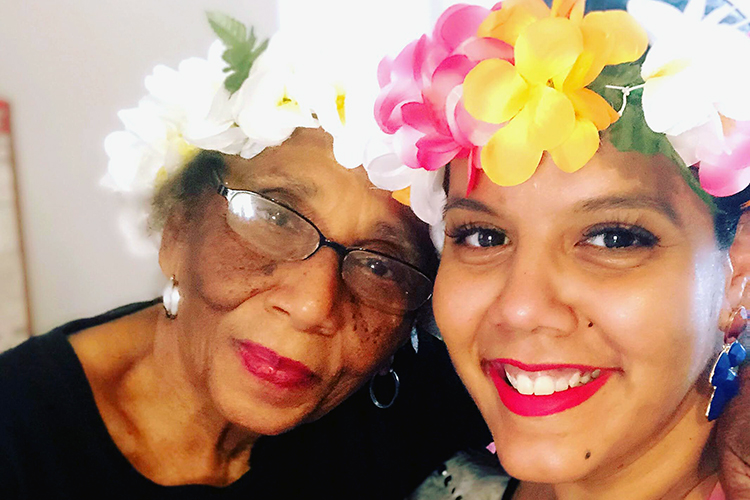Dania Matos: What my grandma taught me about leadership
"This collective wisdom and expertise were formative, not only to my experience, but to how I approach my leadership," Matos writes
October 12, 2021

In this On My Mind column, Dania Matos, UC Berkeley’s new vice chancellor for equity and inclusion, discusses what her grandma taught her. (Photo by Brittany Hosea-Small)
Growing up, and even to this day, hearing, “Quieres cafecito?” (Do you want some coffee?) from my abuelita became my favorite time of the day. It signaled when we would sit down for some Cafe Bustelo (Grandma’s favorite) made on la greca, a stovetop espresso maker that traveled everywhere with her. She often kept it in her purse with a whole other host of necessities, but when la greca broke, she even taught me how to make coffee using a sock as the filter. (Yes, a clean sock). As we dipped our Maria cookies (Grandma’s name is also Maria, so we always said they were her cookies) into our cafecito, she would drop some knowledge, the collective knowledge and wisdom of our ancestors, our community and our cultura. It is through these cafecito chats that I learned early on about the colonial subjectivity of Puerto Ricans, the forced sterilizations of our women, and “la guagua aérea (the flying bus) that would take Puerto Ricans to New York. She kept it very real.
‘On My Mind’
‘On My Mind’ is a space for senior campus leaders to communicate with the Berkeley community.
This collective wisdom and expertise were formative, not only to my experience, but to how I approach my leadership. However, in many ways, this ran counter to the individualism cultivated in many parts of the continental United States, where people are more likely to prioritize themselves and their singular knowledge over a group.
I’ve now been at UC Berkeley for two months. In that short time, I’ve observed, listened and learned, and, most importantly, I’ve shared my experience and expertise from the beginning. That’s how I was raised. From the time I was young, my mother ensured that I knew that I was born into a struggle, and that part of that struggle required a relentless pursuit of equity and justice. She raised me to think and use my voice to do something about the world I was inheriting for the well-being of all.

“As we dipped our Maria cookies … into our cafecito, she would drop some knowledge, the collective knowledge and wisdom of our ancestors, our community and our cultural,” Matos wrote. (Image courtesy Dania Matos)
Even though I’m used to using my voice to advocate for all and being authentic – a confident and intelligent Afro Latina – I haven’t always seen myself as an expert. Recently, I shared on Twitter that it took a magazine article calling me an expert to realize I was one. There were no visible representations of people who looked like me named “experts” as I grew up. The second I realized I did not have to wait for a magazine or any other external source to claim it for me, I claimed it for myself. Since then, I haven’t looked back.
I share this experience with you because I’m now calling on you to do the same. Each of us is an expert of our own experience – lived, learned, studied, embodied, personal, professional, all of it. You are a leader! Own it.
As we journey together to become a Hispanic Serving Institution and transform UC Berkeley into a place where everyone — all students, staff and faculty — thrive, we need all kinds of experts and leaders. The transformation will take time, it will take vision, and it will take the development of transformative practitioners.
What are transformative practitioners? Paulo Freire, writing in Pedagogy of the Oppressed, says they have“an active and persistent curiosity and awareness that examines beliefs, practices, assumptions and norms to detect how power and privilege operate to contribute to inequality and oppression.”
Transformative practitioners engage in both anti-oppressive thinking — developing a deeper understanding of structural and internalized oppression and anti-oppressive action — and collaborative efforts to overcome and dismantle structural and internalized oppression.
For me, as we develop critically conscious transformative practitioners across Berkeley who are working, teaching, researching and studying on campus, we ensure that we all develop the recognition that oppression is constructed by people, can be changed by people, and that we can be a part of making that change.
Let’s learn to develop as critically conscious transformative practitioners and validate all knowledge and expertise like that of my abuelita — and the collective wisdom that doesn’t just come from an individual, but a comunidad (community), too. In that, we will decolonize ourselves as we decolonize the world.